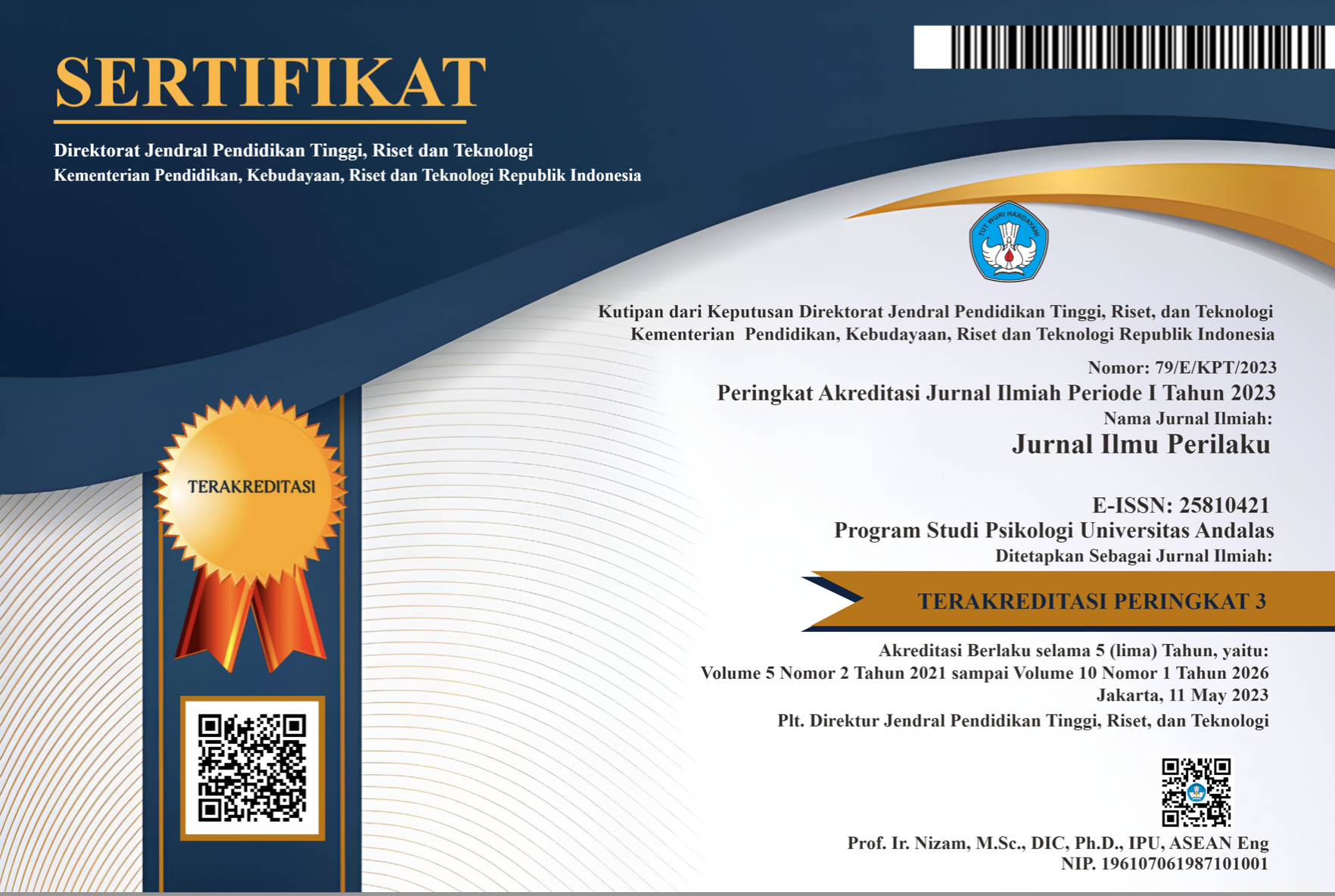Konstruksi Skala Kepedulian terhadap Penggunaan Energi
Abstract
Using electricity and fuel oil might have some negative impact towards the national economy and the environment. Psychological scale for measuring awareness of energy usage has never been tested before. The main purpose of this study is to construct psychological scale for measuring energy usage. The concept of Amburgey (2012) has been used to describe of psychological concern that are perceived threat and desired change. Perceived threat is an evaluation of a person to a problem and desired change is one’s willingness to resolve that problem. Four hundred-thirty eight students were enrolled in this study with a mean of age 21 years old. The results of content item validation show that one item from perceived threat’s subscale has value of Aiken (V) less than .50 and all of items from desired change’s subscale have V value greater than .50. Result from item’s discrimination process show that 40% items from perceived threat’s subscale has low of discrimination power and desired change’s sub scale has 31%. Alpha value for perceived threat’s subscales is .76 and desired change’s sub scale is .78. The concern for energy usage scale has poor model fit.
Downloads
References
Azwar, S. (2012). Penyusunan skala psikologi. Yogyakarta: Pustaka pelajar.
BPS, (2010). Penduduk Indonesia menurut Provinsi 1971, 1980, 1990, 1995, 2000 dan 2010. Diunduh dari www.bps.go.id, diakses pada tanggal 15 November, 2013.
Cook, C. E., Cleland, J., Pietrobon, R., Garrow, A. P., & Macfarlane, G. J. (2007). Calibration of an item pool for assessing the disability associated with foot pain: An application of item response theory to the Manchester Foot Pain and Disability Index. Physiotherapy, 93: 89-95.
Dunlap, R. E. (2008). The new environmental paradigm scale: From marginality to worldview use. The Journal of Environmental Education, 40(1).
Dunlap, R.E., & Jones, R. E. (2002). Environmental concern: conceptual and measurement issues. Dalam R. E Dunlap & W. Michelson, Handbook of environmental sociology. Wesport: Greenwood.
Dunlap, R. E., Van Liere, K. D., Mertig, A. G. & Jones, R. E. (2000). Measuring endorsement of the ecological paradigm: A revised NEP scale. Journal of Social Issues, 56, 425-442.
Furr, R. M., & Bacharach, V. R. (2008). Psychometrics an introduction. Los angeles: Sage.
Hasla, A., Gamble, A., Juliusson, A., & Garling, T. (2008). The relationship between awareness of consequences, environmental concern and value orientation. Journal of Environmental Psychology, 28: 1-9.
Hawcroft, L. C., & Milfont, T. L. (2010). The use (and abuse) of the new environmental paradigm scale over the last 30 years: A meta-analysis. Journal of Environmental Psychology, 30: 143-158.
Huijts, N.M.A., DeGroot, J. I. M., Molin, E.J.E., & VanWee, B. (2013). Intention to act toward a local hydrogen refueling facility: moral consideration versus self-interest. Transportation Research Part A, 48: 63-74.
Jacovcevic, A., & Steg, L. (2013). Sustainable transportation in Argentina: Values, beliefs, norms and car use reduction. Transportation Research Part F, 20: 70-79.
Karpiak, C. P., & Baril, G.l. (2008). Moral reasoning and concern for the environment. Journal of Environmental Psychology, 28: 203-208.
Kementrian Energi dan Sumber Daya Mineral. (2011). Efisiensi dan konservasi energi di Indonesia. Jakarta: Direktorat jenderal energi terbarukan dan konservasi energi kementrian energi dan sumber daya mineral Indonesia.
Kline, R. B. (2005). Principles and practice of structural equational modeling, 2nd edition. London: The Guilford Press.
Osumanu, I. K. (2007). Environmental concern of poor households in low income cities: The case of the Tamala Metropolis, Ghana. Geo Jurnal: 68:343-355.
Shahbaz, M., Hye, Q. M. A., Tiwari, A. K., & Leito, N.C. (2013). Economic Growth, energy consumtion, financial development, international trade and CO2 emmision in Indonesia. Reneweble and Sustainable Energy Reviews, 25: 109-121.
Singhirunnusorn, W., Luesopa, P., Pansee, J., & Sahachaisaeree, N. (2012). Student’s behavior toward energy conservation and models of transportation: A case study in Mahasarakham university. Social and Behavioral Science, 35: 764-771.
Singh, R., & Setiawan, A. D. (2013). Biomass energy policies and strategies: Harvesting potential in India and Indonesia. Renewable an Sustainbility Energy Reviews, 22: 322-345.
Snelgar, R. S. (2006). Egoistic, altruistic and biospheric environmental concern: Measurement and structure. Journal of Environmental Psychology, 26: 87-99.
Steg, L., Dreijerink, L., & Abrahamse, W. (2005). Factor influencing the acceptability of energy policies: A test of VBN theory. Journal of Environmental Psychology, 25: 415-425.
Takeuchi, M., Miyaoka, H., Tomada, A., Suzuki, M., Lu, X., & Kitamura, T. (2011). Validity and reliability of Japanese version of the temperament and character inventory: A study of university and college students. Comprehensive Psychiatry, 52: 109-117.
Urban, J., & Scasny. (2012). Exploring domestic energy saving: The role of environmental concern and backround variables. Energy Policy, 47: 69-80.
Van Birgelen, M., Semeijn, J., & Behren, P. (2011). Explaining pro environmental consumer behavior in travel. Journal of Air Transportation Management, 17: 125-128.
Wijaya K. (2010). Prospek bioetanol di Indonesia. Dalam Jusmina,. Wijaya, K., & Budiman, A, Dari Yogyakarta untuk energi Indonesia: Pandangan dan hasil riset pakar Universitas Gadjah Mada di bidang energi. Yogyakarta: Pusat study energy UGM.
Yen, N. S., Shakur, E. S. A., & Wai, C. W. (2010). Energy conservation opportunities in Malaysian Universities. Malaysian Journal of Real Estate.
Zhang, Y., Wang, Z., & Zhou, G. (2013a). Antecedents of employee electricity saving behavior in organization: An empirical study based on norm activation model. Energy Policy, 62: 1120-1127.
Zhang, Y., Wang, Z., & Zhou, G. (2013b). Determinant of employee electricity saving: The role of social benefits, personal benefits and organizational electricity climate. Journal of Cleaner Production, S0959-6526(13)00697-5.
The non-commercial use of the article is governed by the Creative Commons Attribution license as currently displayed on Creative Commons Attribution-NonCommercial-ShareAlike 4.0 International License.
JIP's spirit is to disseminate articles published are as free as possible. Under the Creative Commons license, JIP permits users to copy, distribute, display, and perform the work for non-commercial purposes only. Users will also need to attribute authors and JIP on distributing works in the journal.
Please find the rights and licenses in Jurnal Ilmu Perilaku (JIP).
- License
The non-commercial use of the article will be governed by the Creative Commons Attribution license as currently displayed on Creative Commons Attribution-NonCommercial-ShareAlike 4.0 International License.
- Author’s Warranties
The author warrants that the article is original, written by stated author(s), has not been published before, contains no unlawful statements, does not infringe the rights of others, is subject to copyright that is vested exclusively in the author and free of any third party rights, and that any necessary written permissions to quote from other sources have been obtained by the author(s).
- User Rights
JIP's spirit is to disseminate articles published are as free as possible. Under the Creative Commons license, JIP permits users to copy, distribute, display, and perform the work for non-commercial purposes only. Users will also need to attribute authors and JIP on distributing works in the journal.
- Rights of Authors
Authors retain the following rights:
- Copyright, and other proprietary rights relating to the article, such as patent rights,
- The right to use the substance of the article in future own works, including lectures and books,
- The right to reproduce the article for own purposes, provided the copies are not offered for sale,
- The right to self-archive the article.
- Co-Authorship
If the article was jointly prepared by other authors, the signatory of this form warrants that he/she has been authorized by all co-authors to sign this agreement on their behalf, and agrees to inform his/her co-authors of the terms of this agreement.
- Termination
This agreement can be terminated by the author or JIP upon two months’ notice where the other party has materially breached this agreement and failed to remedy such breach within a month of being given the terminating party’s notice requesting such breach to be remedied. No breach or violation of this agreement will cause this agreement or any license granted in it to terminate automatically or affect the definition of JIP.
- Royalties
This agreement entitles the author to no royalties or other fees. To such extent as legally permissible, the author waives his or her right to collect royalties relative to the article in respect of any use of the article by JIP or its sublicensee.
- Miscellaneous
JIP will publish the article (or have it published) in the journal if the article’s editorial process is successfully completed and JIP or its sublicensee has become obligated to have the article published. JIP may conform the article to a style of punctuation, spelling, capitalization, referencing and usage that it deems appropriate. The author acknowledges that the article may be published so that it will be publicly accessible and such access will be free of charge for the readers.










